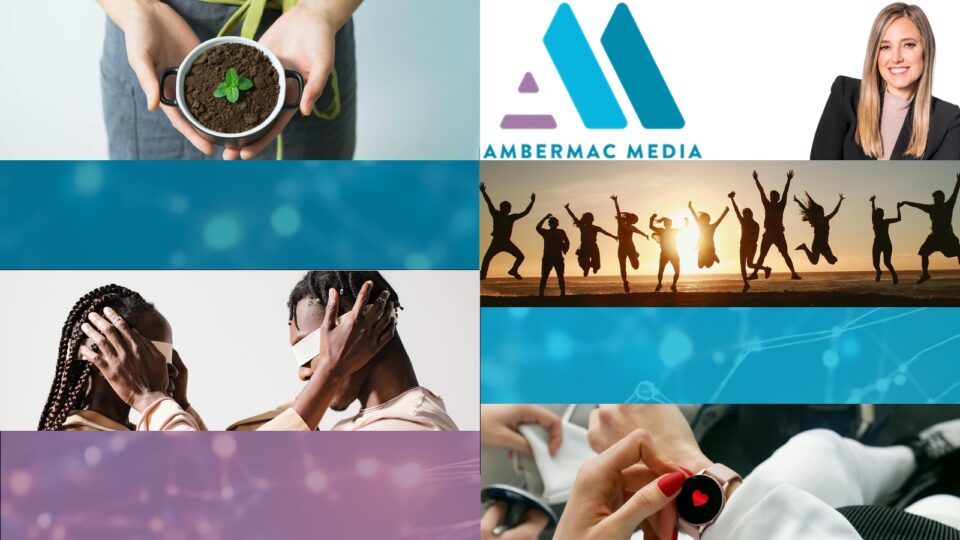
AmberMac 2025 Tech Trends Report: Beyond ChatGPT
by Amber Mac on January 13, 2025
Over the years, I’ve published my annual tech trends report with various themes, from survival during the COVID-19 pandemic to transformation during our post-pandemic recovery. In 2025, I want to talk about relentless adaptation beyond ChatGPT in the age of AI.
As we kick off a new year, the world feels wildly unpredictable. The institutions we have grown to trust over many decades are now under attack. Scientific progress is, unfortunately, too often up for debate. While advancements in AI technologies will solve some of our problems – from healthcare gaps to increased productivity – this same technology will also lead to critical challenges (which I’ve discussed at length in this newsletter, including algorithms of hate and deepfake videos).
There is no clear path forward, unless, of course, you chart one. That’s the theme of this special 2025 issue. In the blank space we call the future, planning and pivoting are essential.
For many months, I’ve shared my blueprint called The P.A.T.H., and in 2025 there are a number of important updates that will further help each of us (and our businesses) to thrive in an AI world.

Purpose: Drive Growth
In the business sense, the term purpose has evolved to mean a number of different things to different people, and some leaders go further down the purpose-driven business path than others (think Patagonia with their 2022 mandate that Earth is now their only shareholder, a move to build a brand with climate action at the core of everything they do). In 2025, we will continue to see signs that a defined purpose is what the next generation wants.
For example, “94% of Gen Z and 95% of Millennials agree that they are motivated by the desire for more meaningful work that aligns with their personal values”. In fact, according to this 2024 RBC study, pursuing meaningful work is overtaking the desire to make more money.
When recruiting new team members – which is a huge challenge today as older generations retire from industries such as manufacturing and mining – putting purpose into focus is not just a nice-to-have but rather an essential part of growing your business.
Speaking of growing teams, there has been a mob-like backlash over the past few years with regard to DEI initiatives. While some companies are canceling such programs, often bowing to activist investors, Costco just recently showed us a better path forward.
In late December of last year, the retailer and employer of more than 300,000 people stood up to the backlash against DEI. Why? As Costco shared: “(our) member-customers come from all walks of life and backgrounds… As our membership diversifies, we believe that serving it with a diverse group of employees enhances satisfaction. Among other things, a diverse group of employees helps bring originality and creativity to our merchandise offerings, promoting the ‘treasure hunt’ that our customers value.”
As author Ron Tite notes, “equality, sustainability, and inclusivity are merely table stakes for any business that wants to thrive in a caring world… When it comes to your organization’s purpose, the truth is, it is all about driving growth, not driving perception.”
In other words, the world is caring more now than ever, so let your purpose help to drive your growth.
📖 What to Read: The Purpose of Purpose by Ron Tite 📖

AI: Build Agents
If ChatGPT is about finding answers, AI agents are about taking action. In 2025, AI agents are the main focus for big tech players, from OpenAI to Google and beyond. Speaking of AI agents, I’ve spent a lot of time these past few months working with Salesforce to learn more about the agent revolution (including building an agent to manage new client requests on my website).
Think of AI agents as an accessible way to grow your team at home and at work. These AI agents can book travel for you, schedule appointments for you, manage your customer requests, and even stay on top of at-home purchasing.
“Gartner suggests agentic AI is the most important strategic technology for 2025 and beyond. The tech analyst predicts that, by 2028, at least 15% of day-to-day work decisions will be taken autonomously through agentic AI, up from 0% in 2024.”
If you haven’t yet thought about the impact that AI agents will have on what you do, make sure 2025 is the year you give them a try.
🛠️ Tools to Try: 16 Best AI Agent Builders for 2025 🛠️

Trust: Find Courage
2025 will be a year of fighting misinformation and disinformation, and it will be more of a major battle than an insignificant fight. The late historian and philosopher Hannah Arendt said it best when she warned many decades ago about the dangers of organized lying. Little did she know that not only would these lies be organized, but that algorithms would amplify them to more successfully sow chaos.
At the same time that algorithms are promoting misinformation and disinformation, trust in news media is at an all-time low. According to the polling firm Gallup’s 2024 analysis, “the news media is the least trusted group among 10 US civic and political institutions involved in the democratic process”. Meanwhile, trust in independent media has risen. As Quill reported in 2024, “one-third (33%) of Americans reported having changed their opinions on a topic or brand discussed in a podcast”.
As for trust in brands, it might surprise you that the most trusted brand last year was Band-Aid, followed by UPS, Google, Lysol, and Dove. It’s not easy to rebuild trust, but it is possible. There’s something called the triangle of trust that I regularly speak about in my keynotes, which includes transparency, consistency, and communication, but there’s another key factor that needs to be added to the mix: courage.
Courage includes standing up to the forces that helped to erode trust in the first place. The Costco news above is a good example of a business that believes its DEI efforts are worthwhile, citing facts over feelings.
In the Bloomberg opinion piece below, the author says it best: “The path forward is not neutrality but de-polarization”. It will take many courageous leaders to pursue this path.
📖 What to Read: Trust in Business 📖

Health: Wear AI
While there is much to say about AI in healthcare, including new tech that allows for life-saving cancer diagnosis and detection, there is also a critical connection to wearable tech. According to IDC, “wearable device shipments are expected to reach 635.7 million in 2027, up 17% from 543 million in 2023″.
The wearables category includes rings, watches, wristbands, glasses, earwear, clothing, and more. In a world with gaps in care, more people are opting to gather their own data on sleep, strain, heart rate variability, and other health metrics. Healthcare teams that leverage this personal and real-time information can better serve their patients. This partnership can help with early detection, remote care, tailored treatment, and much more.
Beyond care, cost is another factor. While there is an upfront cost to some of this new technology, it’s getting more affordable and accessible. For example, Samsung’s new smart ring doesn’t require a subscription, which has been the norm with some wellness wearables.
The Samsung Galaxy Ring has three high-tech sensors to monitor your heart health, track your activity, and measure your skin temperature. Alongside other metrics and AI features, this helps to give you an overview of your health in a dashboard on your phone.
Some of this personal health and wellness tech can help the healthcare industry to better treat patients and reduce costs. As researchers predicted a few years ago – before we saw the new AI advances built into our personal tech – “to cope with growing amounts of medical data from wearable devices, healthcare providers may need to adopt artificial intelligence that can identify data trends and spot any deviations that indicate illness. Greater medical data, accompanied by artificial intelligence to analyze it, could expand the capabilities of human health care providers and offer better outcomes at lower costs for patients.”
Of course we also need to ensure privacy is protected along the way.
📖 What to Read: Samsung Galaxy Ring Review 📖
In conclusion, in 2025, it’s time to think beyond ChatGPT. Sure, its maker, OpenAI, continues to innovate, bringing exciting new releases and powerful technology into the palms of our hands. However, there’s a lot more out there that fits into the broad category of artificial intelligence that can provide meaningful answers to the many challenges in our lives.
To unlock this potential, AI must have guardrails in place, which should be the role of industry and government working together. As leaders in our own spaces, we can also thrive during this time by following the blueprint above.
